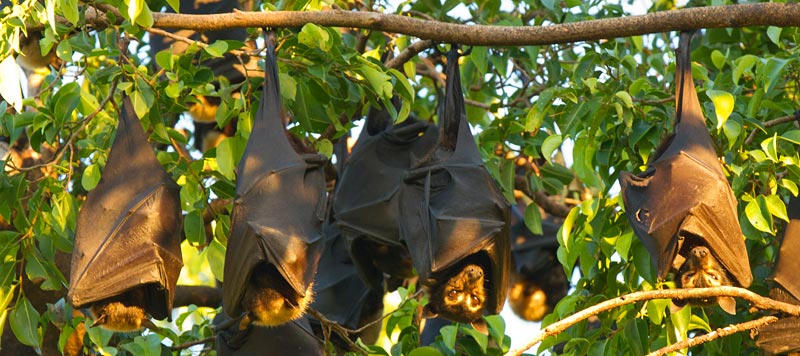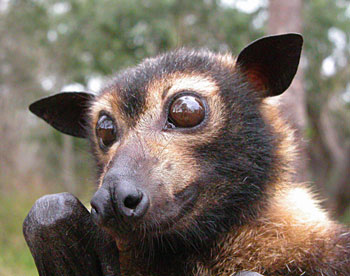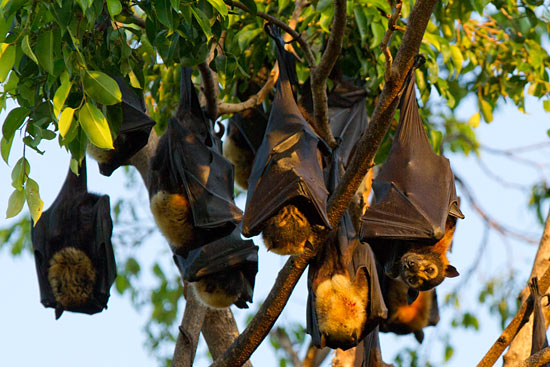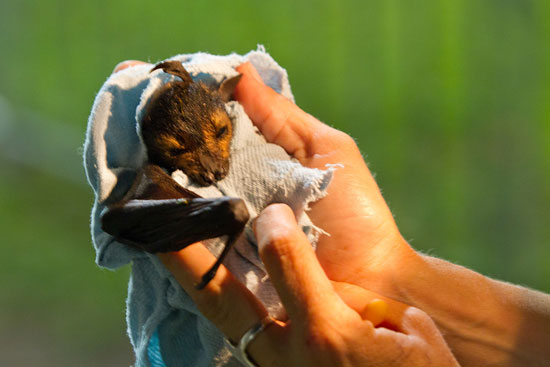
Save Cairns' Flying Foxes
16-Oct-2014 Filed in: Travels
16October

The rarest, most vulnerable and cutest (IMHO) of Australia’s four flying fox species is the Spectacled Flying Fox. This is so named because of their reverse “panda eyes”. For me, this seems only to accentuate their character and their charm. This species is limited to a small region of northern Australia and coastal New Guinea - with Cairns being one of the few places in Australia where they’re found in significant numbers. To the amazement of tourists such as myself, you don’t need to travel far or pay for a tour - since there’s a colony of flying foxes living right in the centre of town, in mango and fig trees outside the town’s public library. The black tear-drop shapes and busy social chatter are impossible to miss, attracting many curious passers by. These flying foxes also present visitors with a spectacular sight at dusk as thousands of winged shapes take to the air against a glorious backdrop of indigo-blue sky and orange setting sun. Even for those who aren’t fans of bats, its truly something special and a reminder of the majesty of Australia’s natural environment.
Now, enter a greedy hotel developer (not a particularly good one at that), and an inept local council. Instead of protecting those things which make Cairns unique, they’re set to destroy them in return for a quick profit ... irrespective of the longer-term negative impact. The Novotel Oasis (so-called) resort hotel is one of those places that looks great on paper. It has an impressive lobby and a pool area with an artificial beach. However, unless you’re springing for the presidential suite or something equivalent, the rooms are very lacklustre and obviously haven’t had any makeover for a decade or two. The old grey carpets, grey walls, and wheezy taps (at least in room 272 where I stayed) are nothing to write home about - they’re plain and rather boring. Unbelievably in this day and age, there’s no wi-fi Internet unless you’re in the lobby area. A call to reception to enquire about Internet revealed they had “wired” Internet - but it meant a five-minute walk to/from reception to borrow an ethernet cable. Incredible! The last hotel where I actually needed a network cable (circa 2006) had the decency to have them pre-installed in the room. The problem now is that tablets, iPads, and notebooks such as the Macbook Air, don’t even have an ethernet port - on the basis that wi-fi has been universal for years ... except at the Novotel Oasis Cairns. To make matters worse - the room smells musty, there’s dubious biological residue smeared across room items, there are no power sockets for recharging phones/iPads next to the bed (important since they’re my alarm clock), and the fridge is empty (chilled water would have been nice). The hotel is wholly uninspiring and not particularly welcoming.

As such, the hotel is pressuring the Cairns Regional Council to cut down 11 trees harbouring portions of the bat colony. These reportedly aren’t Novotel’s trees to cut. Instead, they’re explicitly covered by a preservation order agreed by Novotel as a condition for a historic land purchase from a former primary school. They’re actually some distance from the hotel on the other side of a vacant lot. My best guess of the true reason for overturning the preservation order and removing the trees is that the hotel has development or sale ambitions and has decided that the old agreement is an obstacle to turning a quick buck. Even worse, and in disregard of its own recovery plan for the flying foxes, the CRC’s elected officials have sided with their Novotel cohorts to approve the removal. Sadly, this is only the latest in a series of recent incompetent foul-ups by the CRC negatively impacting the colony. In May, the CRC set out to “trim” the trees - reportedly removing far more than the maximum allowable 20%, causing significant stress to the colony, and leaving one of the major trees in danger of collapse. These stresses, along with spraying by the council, appear to be causal factors in this year’s disastrous flying fox breeding season in which over 100 flying fox babies have so far been found within the immediate area either stillborn or suffering extreme birth deformities and needing to be euthanised. So much for the Cairns Regional Council’s efforts to protect and encourage a vulnerable species. According to CSIRO, numbers are down 90% across all Spectacled Flying Fox colonies. Clearly its a case that the CRC are failing in their mandate of due care.
Don’t get me wrong. I realise that there’s a balance between protecting the environment, and ensuring opportunities for employment and economic development. When living in Brazil, I got frustrated hearing environmentalists who utterly failed to grasp that people living in the Amazon region also had a right to expect a good home, modern conveniences, a future, and education for their kids. Yes, jobs and economy are important. But my point is that ensuring quality of life for residents doesn’t preclude protecting the environment ... and, in most cases, environmental protection is actually one of the best ways to maintain that quality of life. After all, who wants to live in a bleak and polluted landscape. As mentioned above, flying foxes are highly beneficial for our environment. They’re an attraction for tourists who travel to Cairns from across the globe, and a contributor to the quality of life for Cairns’ residents. They deserve to be protected.
Despite the fact that both the Novotel and CRC appear to have zero interest in preserving Cairns’ flying foxes, I was relieved to encounter some like minded individuals during my short stay in the city. I’d left my room at the hotel shortly before dusk - hoping to get good images of the bats in the golden light of the late afternoon sun. During my time taking photos, I noticed quite a few other tourists stopping to take photos and gaze upwards (reinforcing my point that the flying foxes are an asset). There were barriers erected around one of the main trees - with a notice advising that it was breeding season for the colony, with the flying foxes currently nursing their young, and that occasionally some of the young fall from the tree. After a few minutes taking photos, I noticed a small group of locals looking up anxiously, pointing, and talking together in a huddle. After several more minutes, another of their number returned with several lengths of aluminium tubing and a small net. An eagle-eyed observer had seen a flying fox baby which had obviously fallen down from its mother - but was now stuck in other branches (still high up), alone and in danger of starvation.
What followed was an improvised rescue - in failing light and under thousands of winged silhouettes overhead as the bats set out for the night. The tubing wasn’t long enough to reach the baby - so it was further lengthened by adding more items including what looked to a feather duster retrieved from someone’s car. All this was duct taped together in a fashion that would have made MacGyver proud - as one of the volunteers performed a feat of strength lifting the pole up (now bending under its own weight). Even more amazingly, the volunteer managed to hold the pole upright at arms length for a period of about 15 minutes as it was manoeuvred around the tree with multiple attempts being made to retrieve the baby flying fox. For much of this time, it was impossible to see in the darkness - with only a small weak torch held by one of the other volunteers for illumination. All I can say is that it was an impressive feat of strength, determination, and the volunteers’ passion to help the flying foxes that led to the eventual successful rescue of the stranded baby from high up in the tree. I was truly astonished at the amount of effort and the dedication of everyone involved. Hence, despite the huge forces now arrayed against the flying foxes in Cairns, I have hope knowing that they have a team of vigorous and determined defenders on their side. Word from the rescuers was that the baby appeared healthy and stood a good chance for survival. It was taken away to the Tolga Bat Hospital to be further checked before being placed into the hands of carers.
My final thoughts for the Cairns Regional Council, Mayor Bob Manning, and Novotel Oasis are as follow: Appreciate the flying foxes and leave them alone - since they contribute more to your economy than you think. Instead of your current focus on cutting down trees because you find the colony’s presence temporarily inconvenient, consider placing the emphasis on planting more trees - creating more areas with suitable future habitat and food sources (possibly in other nearby locations which you believe more convenient). With storms and ageing, the existing trees won’t be there forever anyway. You’ll often find its better for everyone in the long term to work with nature, not against it.
Note: If you also want to see Cairn’s Flying Foxes protected, please consider visiting the Save the Cairns CBD Spectacled Flying Fox Colony page on Chuffed.org and making a donation.

Photo credits: Spectacled Flying Fox close-up (Wikimedia Commons/CSIRO)
Remaining photos: Andrew Mercer

Andrew Mercer
I'm a Business Intelligence and Data Warehousing consultant based in Brisbane, Australia. I've consulted on or managed several large BI systems in New Zealand, Australia and Latin America.

Contact Info
Please use the contact form on this site.
Or phone 04 5704 1640 (Australia)
Or phone 04 5704 1640 (Australia)
Navigation
Photos
Latest Articles
blog comments powered by Disqus
